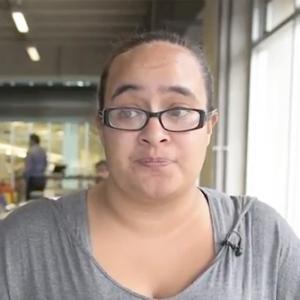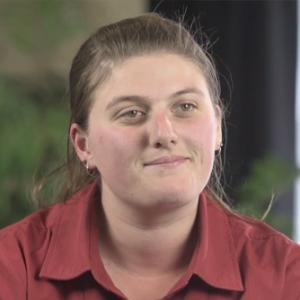
James
"I had this teacher... she's just been fantastic and stuff, just trying to help me... and she was gold, eh, she was like one of my heroes from that school"

Peter
"You need to know a bit about the students, what expectations they live up to, and what they can do as well."

Katherine
"Teachers knew I was deaf, they just didn't really take on what it meant... I don't remember any actual teachers being helpful"

Watch James’s film. James talks about the difference one teacher can make to a student. He talks about his teacher as being like “gold”. Watch Aimee’s film. Aimee talks about teachers who were helpful, and also teachers who she felt did not support her.
1. What are some of the things that teachers and other adults did that made school so much better for James and Aimee?
2. What do these things say about what is important in being a good teacher?
Watch Cecilia’s film. Cecilia talks about how much she loved school and her teachers.
Watch Katherine’s film. Katherine talks about one teacher who believed in her ability to learn. She also talks about her teachers knowing she was deaf, but doing little to help her to access learning opportunities.
1. How can Cecilia and Katherine’s experiences help us to understand what makes a positive relationship with teachers?
2. How can their stories help teachers to think about the ways they view and work with students?
3. In what ways did teachers impact on how Cecilia and Katherine saw themselves as learners?
"Don't give up! I believe in you all. A person's a person, no matter how small"
- Dr Seuss (Horton Hears a Who)
Teaching using our heart, our head and our hands
Teachers who practice inclusively and are culturally responsive approach teaching as a moral, values-based craft. In approaching their relationships and teaching, they use their heart, their head, and their hands.
- What does this mean?
Using our heart is about consciously exploring the relationship between our philosophy (beliefs, values and visions) and our actions. When we use our head we consider and develop the theories, knowledge and frameworks that inform our work. When we engage the hand, we pay attention to the skills and strategies that we use in everyday practice. Students describe good teachers as those who care about, listen to and know about them. Good teachers are positive people, they recognise where and when they a student needs support, want to and know how to scaffold their learning. They like teachers who believe in them and their ability to participate and achieve. They want to participate in school duties alongside their peers, sports, and other class activities.
Macfarlane, Macfarlane, Savage & Glynne, 2012;
Sergiovanni, 1994; Wink, 2011.
Teachers and Teaching Resources
Teachers can learn from other teachers, researchers, students, whanau, disabled people and advocates who have thought, talked and written about challenges, solutions and inclusive education. These two New Zealand websites contain resources (text, visual, film) that schools and teachers can use to further understand and implement inclusive values and practices.
Inclusive Education: Guides for Schools
This resource contains videos and stories from New Zealand schools and students/ families/ teachers working together.
Inclusive Education Guides for Schools: http://inclusive.tki.org.nz/
Best Evidence Synthesis (BES) programme.
This programme focuses on supporting quality teaching and learning for all children. www.educationcounts.govt.nz/topics/BES